Jasmine tea offers a perfect blend for relaxation due to its unique combination of aromatic compounds and calming properties. You'll find stress-reducing effects from L-theanine, which promotes relaxation without drowsiness and increases alpha wave production in your brain. The tea's soothing floral aroma, created by linalool and benzyl acetate, can improve your mood and sleep quality. With lower caffeine content than coffee, jasmine tea provides a gentle lift without jitters. Its antioxidants protect against oxidative stress, while traditional Chinese medicine has long used it for various health benefits. Discover how this delicate blend can transform your relaxation routine.
Key Takeaways
- Jasmine tea contains L-theanine, promoting relaxation without drowsiness and increasing alpha wave production in the brain.
- The soothing aroma of jasmine flowers combined with tea creates a calming effect, reducing stress and improving mood.
- Regular consumption enhances sleep quality through relaxation-promoting compounds like L-theanine and GABA.
- The ritual of preparing and drinking jasmine tea can serve as a meditative practice, further enhancing its relaxation benefits.
- Lower caffeine content compared to coffee provides a gentle mood lift without causing jitters or anxiety.
Origins of Jasmine Tea
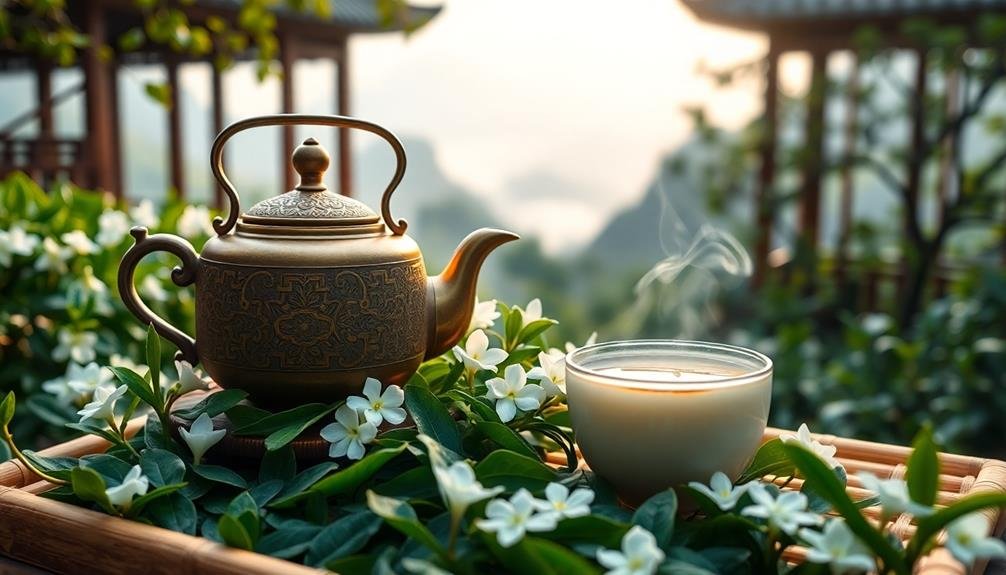
Originating in China during the Song Dynasty (960-1279), jasmine tea has captivated tea lovers for centuries.
It's believed that the practice of scenting tea with jasmine flowers began in the Fujian province, where the climate was ideal for both tea and jasmine cultivation. The art of blending jasmine with tea quickly spread throughout China and eventually to other parts of Asia.
You'll find that jasmine tea is typically made using green tea as a base, though white and oolong teas are sometimes used.
The production process is meticulous, with tea leaves harvested in spring and stored until summer when jasmine flowers bloom. Fresh jasmine blossoms are then layered with the tea leaves, allowing the tea to absorb the flower's fragrance overnight. This process may be repeated several times to achieve the desired level of scenting.
The resulting blend offers a delicate floral aroma and a smooth, subtly sweet taste that's become synonymous with relaxation.
Today, you can enjoy jasmine tea worldwide, but its roots in Chinese culture and traditional medicine continue to influence its reputation as a calming and restorative beverage.
Botanical Profile of Jasmine Flowers
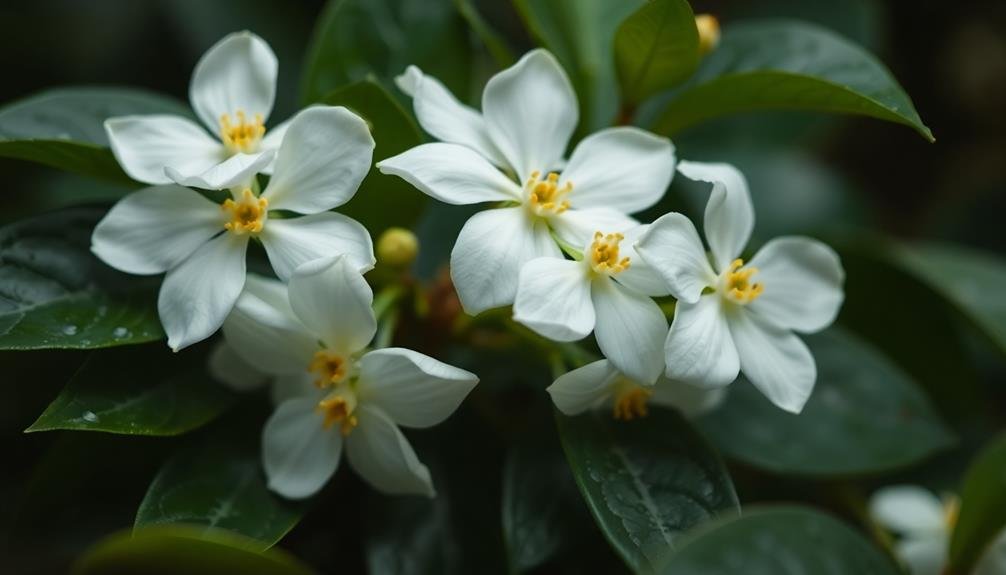
You'll find numerous jasmine species and varieties used in tea production, with Jasminum officinale and Jasminum sambac being the most common.
Jasmine plants are typically cultivated in warm, humid climates and require careful harvesting practices to preserve their delicate flowers.
The aromatic compounds in jasmine, including linalool and benzyl acetate, contribute to its characteristic sweet and floral scent that's prized in tea blending.
Jasmine Species and Varieties
For centuries, the enchanting fragrance of jasmine has captivated tea enthusiasts worldwide. While there are over 200 species of jasmine, only a select few are used in tea production. The most common variety you'll encounter is Jasminum officinale, also known as common jasmine or poet's jasmine. This species is prized for its intense aroma and delicate white flowers.
Another popular variety is Jasminum sambac, or Arabian jasmine. It's known for its robust scent and is often used in higher-grade jasmine teas. You might also come across Jasminum auriculatum, which has a subtler fragrance and is sometimes blended with other jasmine species.
When you're choosing jasmine tea, you'll find that different varieties impart unique flavor profiles. Some offer a sweet, floral taste, while others have a more pungent, musky aroma.
The climate and growing conditions of the jasmine plants can also affect the tea's final flavor. By experimenting with various jasmine species and blends, you'll discover the perfect combination that suits your palate and enhances your relaxation experience.
Cultivation and Harvesting Practices
The art of cultivating jasmine for tea production requires precision and care. You'll find jasmine plants thriving in warm, subtropical climates with well-drained soil and plenty of sunlight. Growers typically space plants about 6 feet apart to allow for proper air circulation and growth.
Jasmine flowers are harvested in the early morning when they're still closed buds. This timing is fundamental as the buds will open in the evening, releasing their intense fragrance. You'll notice skilled harvesters carefully plucking only the most perfect buds, leaving behind any that are damaged or overripe.
The harvesting process is labor-intensive and often done by hand to guarantee quality. Once picked, the buds are quickly transported to processing facilities where they're kept cool to preserve their aroma. It's vital to handle the delicate flowers gently throughout the entire process.
Jasmine plants used for tea production are typically pruned regularly to encourage new growth and maintain a manageable size.
You'll find that most jasmine tea comes from plants that are harvested multiple times throughout the growing season, which can last from spring to fall in ideal climates.
Aromatic Compound Composition
Fragrance enthusiasts and tea lovers alike are captivated by jasmine's complex aroma profile. The flowers' scent is a result of various volatile organic compounds that work together to create its signature fragrance.
You'll find that jasmine's aroma is primarily composed of linalool, benzyl acetate, and indole, along with smaller amounts of other compounds.
Linalool contributes floral and slightly spicy notes, while benzyl acetate adds a sweet, fruity essence. Indole, though unpleasant on its own, enhances the overall fragrance when present in small quantities.
These compounds interact with your olfactory receptors, triggering emotional responses and potentially promoting relaxation.
When jasmine flowers are combined with tea leaves, you'll experience a unique synergy of aromas. The tea's natural compounds blend with jasmine's fragrance, creating a harmonious and soothing beverage.
This aromatic profile is why jasmine tea is often associated with:
- Stress reduction
- Improved mood
- Enhanced focus
- Better sleep quality
Understanding the aromatic composition of jasmine tea can help you appreciate its complexity and potential benefits for relaxation and well-being.
Traditional Uses in Chinese Medicine
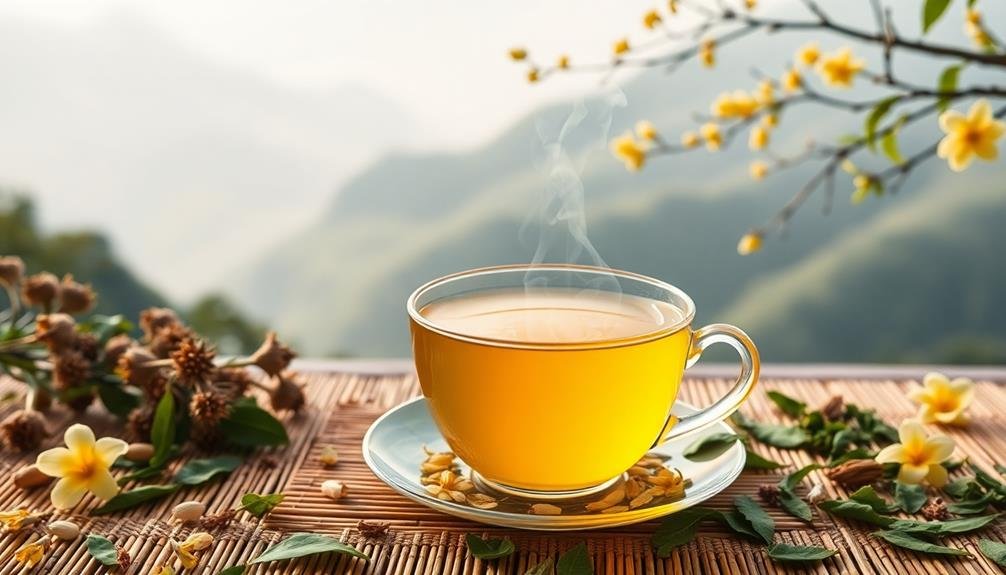
Chinese medicine's long history has embraced jasmine tea as a valuable therapeutic aid. You'll find that traditional practitioners have used this fragrant blend for centuries to address various health concerns. They believe jasmine tea can help regulate your body's heat, soothe digestive issues, and alleviate respiratory problems.
In Chinese medicine, jasmine tea is considered to have a cooling effect on the body. It's often recommended to balance excessive "yang" energy, which is associated with heat and inflammation. You might be advised to drink jasmine tea to reduce fever, calm irritability, or ease headaches.
Practitioners also value jasmine tea for its potential to support your liver and gallbladder functions. They believe it can help detoxify your body and improve overall well-being. Additionally, jasmine tea is thought to have a positive impact on your emotional state, helping to reduce stress and anxiety.
You'll find that Chinese medicine often recommends jasmine tea as a natural remedy for insomnia. Its calming properties are believed to promote better sleep quality and help you relax before bedtime.
Aroma Therapy Benefits
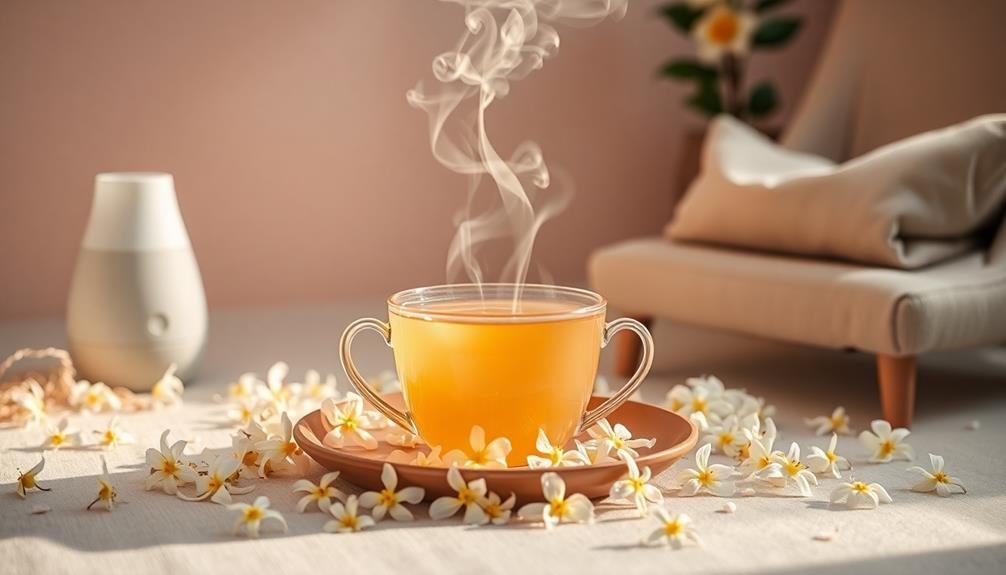
Moving beyond traditional Chinese medicine, jasmine tea's aromatic properties offer significant benefits in aromatherapy.
You'll find that the scent of jasmine can have a profound impact on your mental and emotional state. When you brew a cup of jasmine tea, you're not just preparing a beverage; you're creating a sensory experience that can help you relax and unwind.
The aroma of jasmine tea stimulates your olfactory system, triggering a cascade of positive effects throughout your body.
You'll notice that as you inhale the sweet, floral scent, your muscles begin to relax and your mind becomes calmer. This is because jasmine has natural sedative properties that can help reduce stress and anxiety.
Here are four key aromatherapy benefits of jasmine tea:
- Promotes better sleep quality
- Enhances mood and reduces depression
- Lowers heart rate and blood pressure
- Improves cognitive function and focus
Caffeine Content in Jasmine Tea
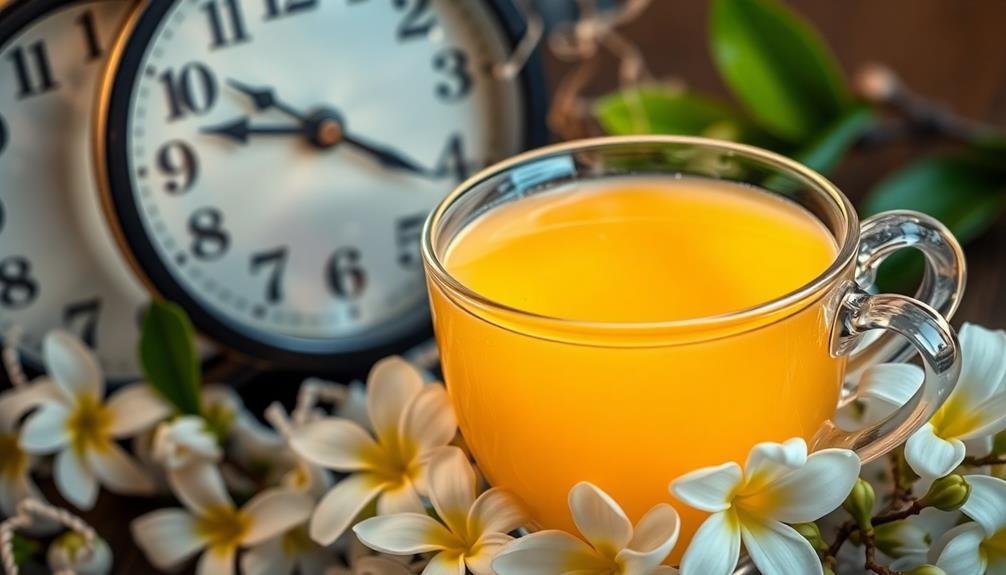
While jasmine tea is renowned for its soothing properties, it's important to understand its caffeine content. The amount of caffeine in jasmine tea depends on the base tea used, which is typically green tea. On average, an 8-ounce cup of jasmine tea contains about 25 to 35 milligrams of caffeine, roughly one-third the amount found in a cup of coffee.
If you're sensitive to caffeine or looking to reduce your intake, you'll be pleased to know that jasmine tea offers a milder caffeine boost compared to many other teas. The caffeine content can vary based on factors like steeping time and water temperature. For a lower caffeine option, choose jasmine tea made with white tea as the base.
Despite containing caffeine, jasmine tea can still promote relaxation due to its L-theanine content. This amino acid works synergistically with caffeine to provide a calming effect while maintaining alertness. You'll experience a gentle lift in mood and focus without the jitters often associated with higher caffeine beverages.
If you're concerned about caffeine, opt for decaffeinated jasmine tea, which retains most of its aromatic and health benefits.
Antioxidant Properties
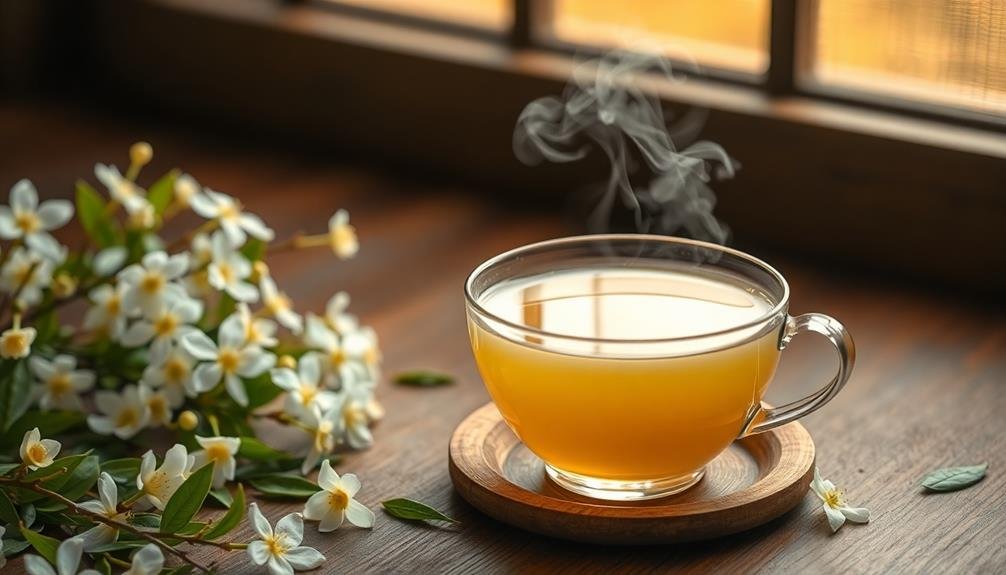
Packed with powerful antioxidants, jasmine tea offers more than just a soothing aroma. These beneficial compounds help protect your body from free radical damage, which can lead to various health issues and premature aging. The antioxidants found in jasmine tea, primarily catechins and polyphenols, work to neutralize harmful molecules and reduce oxidative stress in your system.
When you sip on jasmine tea, you're not only enjoying its delicate flavor but also boosting your body's defense mechanisms. Regular consumption of this antioxidant-rich beverage may contribute to improved overall health and well-being. Some potential benefits include:
- Enhanced immune function
- Reduced risk of chronic diseases
- Improved skin health and appearance
- Better cardiovascular health
The combination of green tea leaves and jasmine blossoms creates a unique blend that maximizes antioxidant content.
While green tea alone is known for its high antioxidant levels, the addition of jasmine flowers may enhance these properties further. By incorporating jasmine tea into your daily routine, you're providing your body with a natural and enjoyable way to combat oxidative stress and support long-term health.
Stress-Reducing Effects
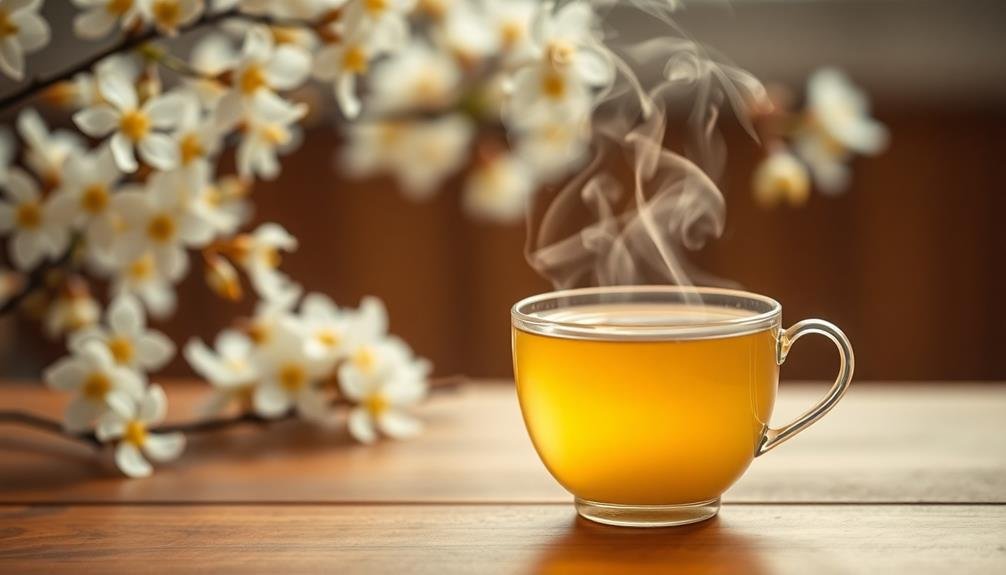
As you sip a warm cup of jasmine tea, you'll experience more than just its delightful aroma and taste. This soothing beverage has powerful stress-reducing effects that can help you unwind and relax after a long day.
Jasmine tea contains L-theanine, an amino acid that promotes relaxation without causing drowsiness. It increases the production of alpha waves in your brain, which are associated with a calm, alert state. This can help reduce anxiety and improve your overall mood.
The scent of jasmine itself has been shown to have calming properties. When you inhale the fragrant steam from your tea, it can lower your heart rate and blood pressure, easing tension throughout your body. This aromatherapy effect complements the tea's internal benefits.
Drinking jasmine tea can also lower cortisol levels, the hormone responsible for stress. By reducing cortisol, you'll feel more balanced and better equipped to handle daily challenges.
Additionally, the ritual of preparing and enjoying a cup of tea can be a meditative practice, giving you a moment of mindfulness in your busy day.
Improved Sleep Quality
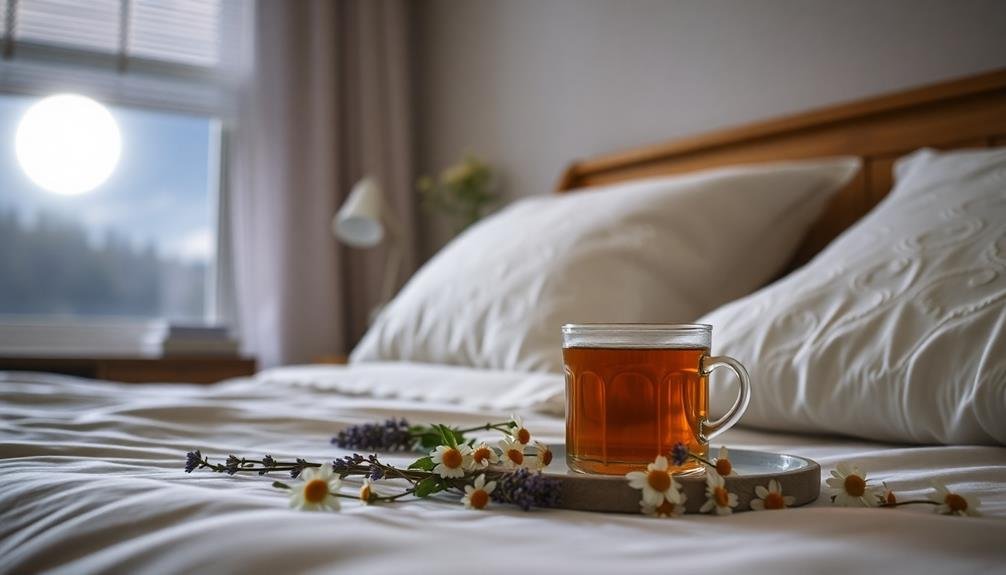
Jasmine tea can greatly enhance your sleep quality, making it an excellent choice for a pre-bedtime beverage. Its natural compounds work synergistically to promote relaxation and prepare your body for restful sleep. The combination of L-theanine and GABA in jasmine tea helps calm your mind and reduce anxiety, allowing you to drift off more easily.
When you incorporate jasmine tea into your nightly routine, you'll likely experience:
- Reduced sleep latency (time it takes to fall asleep)
- Improved sleep duration and efficiency
- Decreased nighttime awakenings
- Enhanced overall sleep quality and feeling of restfulness
The mild caffeine content in jasmine tea won't interfere with your sleep when consumed in moderation, especially if you drink it a few hours before bedtime.
The tea's soothing aroma also contributes to its sleep-promoting effects, as the scent of jasmine has been shown to lower heart rate and blood pressure.
Digestive Health Advantages
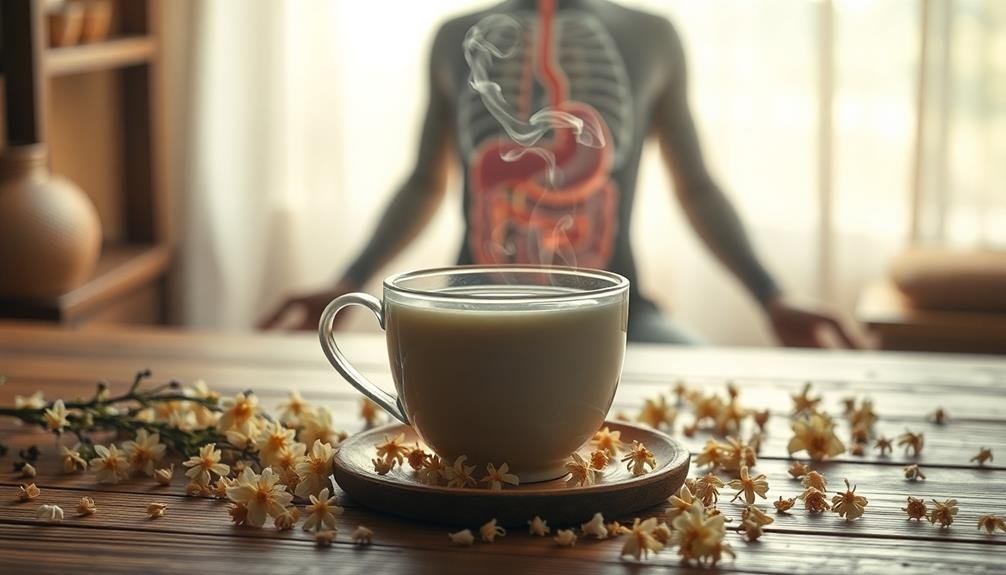
You'll find that jasmine tea offers more than just a calming aroma; it can also benefit your digestive system.
This fragrant brew may help soothe stomach discomfort, easing issues like bloating and indigestion.
Additionally, jasmine tea can promote healthy digestion by encouraging the production of digestive enzymes and supporting overall gut function.
Soothing Stomach Discomfort
Sipping on a warm cup of jasmine tea can provide relief for an upset stomach. The gentle, soothing properties of jasmine combined with green tea's natural compounds work together to calm your digestive system. When you're experiencing nausea, bloating, or general stomach discomfort, jasmine tea can be your go-to remedy.
The tea's warmth helps relax your stomach muscles, easing tension and reducing cramping. Jasmine's aromatic compounds have a calming effect on your nervous system, which can alleviate stress-induced digestive issues.
Green tea's polyphenols and catechins aid in reducing inflammation in your gut, promoting overall digestive health.
To maximize jasmine tea's stomach-soothing benefits:
- Drink it slowly, allowing the warmth to spread through your body
- Inhale the tea's aroma deeply to enhance its calming effects
- Avoid adding milk or sugar, which may counteract the tea's benefits
- Consume it between meals to prevent interference with digestion
Promoting Healthy Digestion
A healthy gut is the cornerstone of overall well-being, and jasmine tea can play a significant role in promoting digestive health. When you sip on this fragrant brew, you're not just indulging in a delightful beverage; you're also supporting your digestive system.
Jasmine tea's digestive benefits stem from its green tea base, which is rich in polyphenols and catechins. These compounds have been shown to improve gut bacteria balance, reducing harmful bacteria while promoting beneficial ones. This microbial harmony can lead to better nutrient absorption and smoother digestion.
The tea's mild caffeine content stimulates the production of digestive enzymes, helping to break down food more efficiently. It also has a gentle diuretic effect, which can aid in flushing out toxins from your system.
Additionally, jasmine tea's anti-inflammatory properties may help soothe digestive tract irritation.
Regular consumption of jasmine tea can contribute to a healthier metabolism, potentially aiding in weight management. It's also been linked to a reduced risk of digestive disorders, including certain types of cancer.
Jasmine Tea Preparation Methods
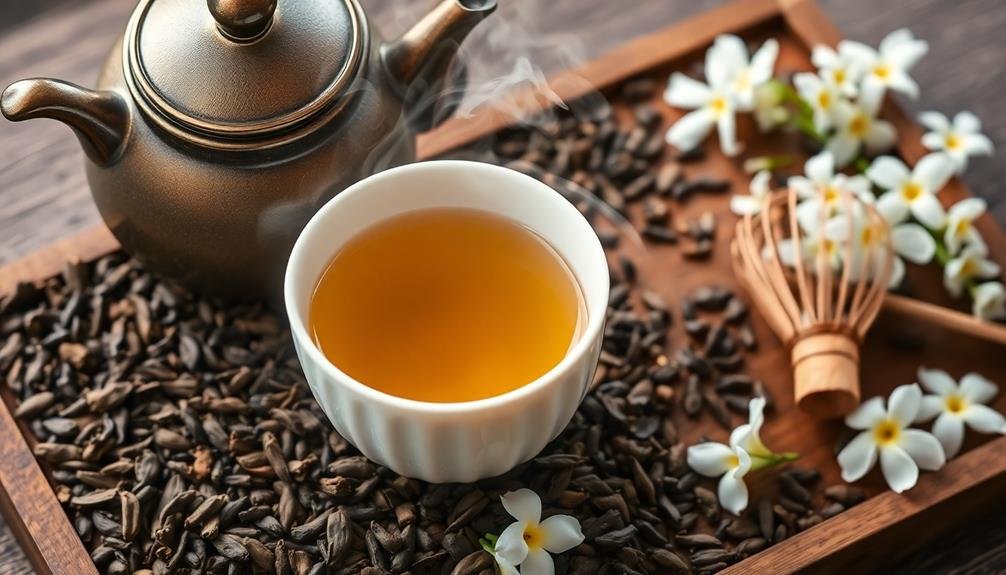
To properly enjoy jasmine tea, it's essential to understand the various preparation methods. You'll find that the way you brew your tea can greatly impact its flavor and aroma.
The most common method is steeping loose jasmine tea leaves or tea bags in hot water for 2-3 minutes. For a stronger brew, you can increase the steeping time, but be cautious not to over-steep, as it may result in a bitter taste.
Another popular method is cold brewing, where you steep the tea in cold water for several hours or overnight. This technique produces a smoother, less bitter taste and is perfect for hot summer days. You can also try brewing jasmine tea in a traditional Chinese gaiwan or a ceramic teapot for an authentic experience.
Here are four key factors to take into account when preparing jasmine tea:
- Water temperature (175-185°F for ideal flavor)
- Steeping time (2-3 minutes for hot brew, 6-8 hours for cold brew)
- Tea-to-water ratio (1 teaspoon per 8 oz of water)
- Quality of tea leaves (use fresh, high-quality leaves for best results)
Blending Jasmine With Other Herbs
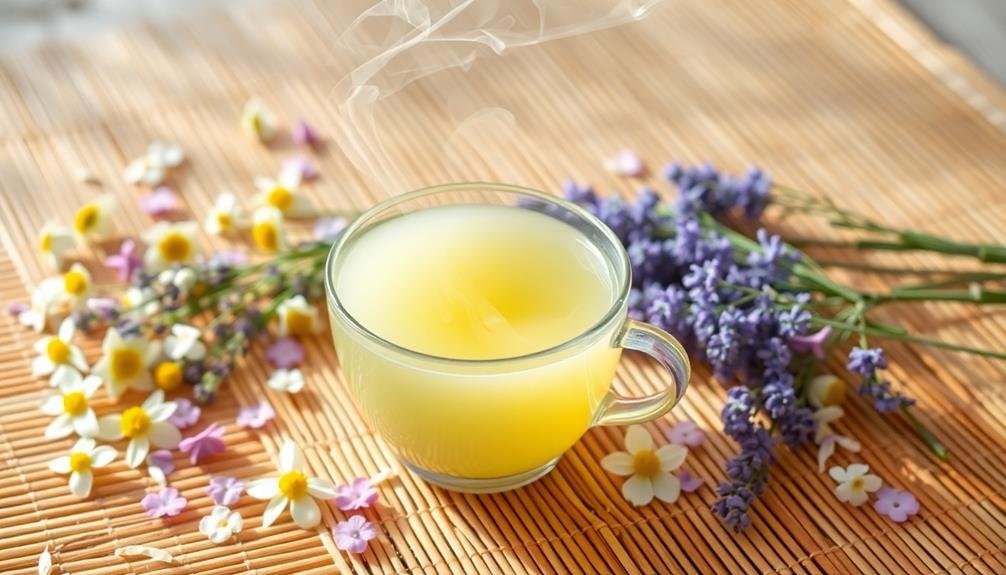
While jasmine tea is delightful on its own, blending it with other herbs can create unique and exciting flavor profiles. You'll find that combining jasmine with complementary herbs enhances its relaxation properties and introduces new dimensions of taste.
Consider pairing jasmine with lavender for a soothing floral blend that promotes calmness and better sleep. Chamomile is another excellent choice, as it adds a subtle sweetness and amplifies the tea's stress-reducing effects.
For an invigorating twist, try blending jasmine with mint. This combination provides a cooling sensation and aids digestion. If you're looking for a more complex flavor, experiment with adding lemongrass or ginger. These herbs contribute zesty notes and offer additional health benefits.
Rose petals can elevate the floral aspects of jasmine tea, creating a luxurious and aromatic blend.
When creating your own jasmine blends, start with a 2:1 ratio of jasmine to your chosen herb. Adjust the proportions to suit your taste preferences.
Remember that some herbs may require different steeping times, so be mindful when brewing your custom blend.
Flavor Profile and Tasting Notes
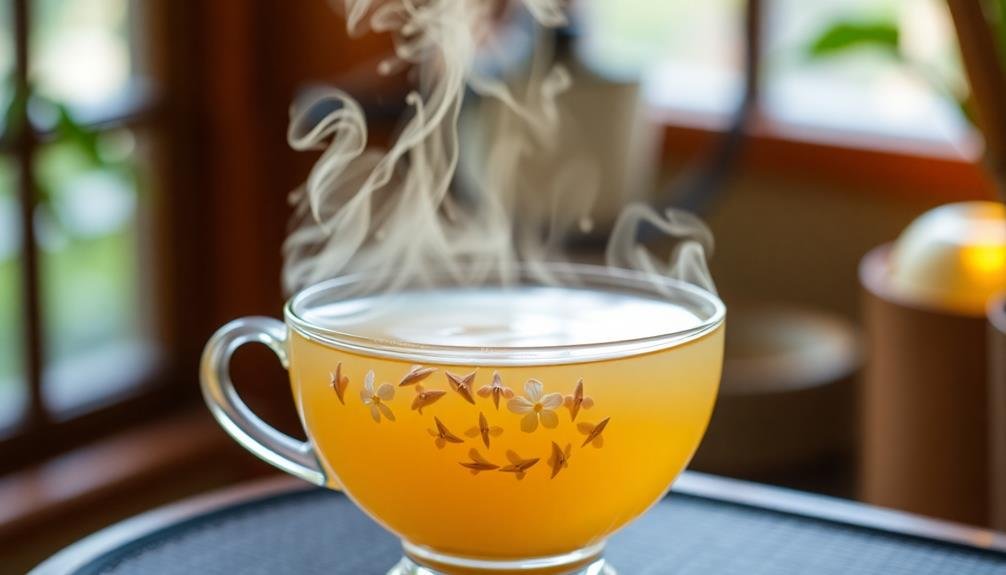
Tasting jasmine tea reveals a complex flavor profile that's both delicate and memorable. You'll immediately notice the floral aroma, which sets the stage for the tea's subtle sweetness. The base green or white tea provides a light, grassy foundation that complements the jasmine's fragrance.
As you sip, you'll experience a smooth, silky mouthfeel that coats your palate with a gentle aftertaste. The flavor of jasmine tea can vary depending on factors like the quality of tea leaves, the jasmine blossoms used, and the brewing method.
Generally, you'll encounter:
- A light, invigorating taste with a hint of natural sweetness
- Floral notes that dance on your tongue without overpowering
- A clean, crisp finish that leaves you feeling revitalized
- Subtle nuances of green or white tea that peek through the jasmine
To fully appreciate jasmine tea's flavor profile, brew it at the right temperature (175°F for green tea base, 185°F for white tea base) and steep for 2-3 minutes. This guarantees you'll capture the tea's delicate essence without extracting bitter notes.
Health Precautions and Considerations
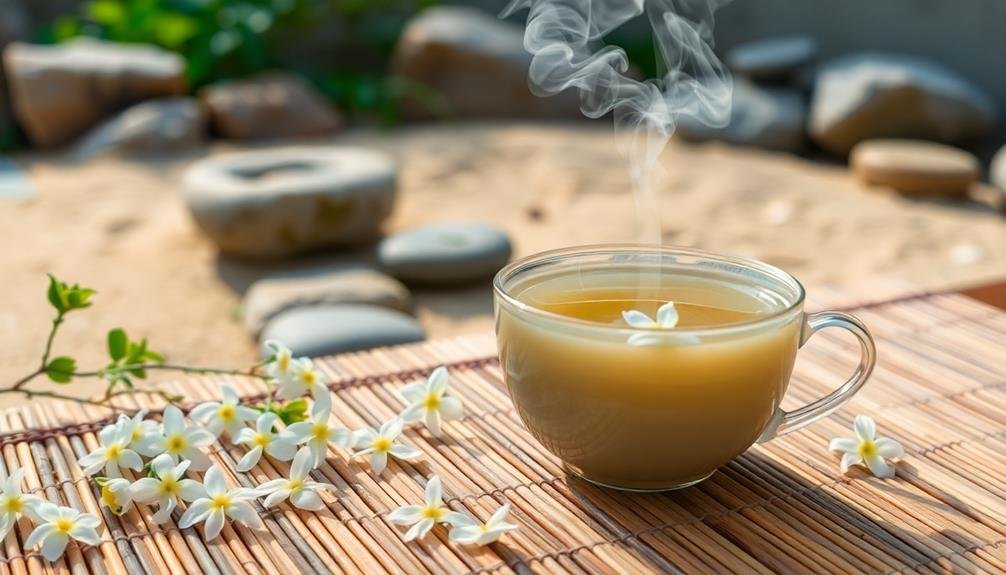
Safety considerations are paramount when incorporating jasmine tea into your wellness routine. While generally safe, you should be aware of potential side effects and interactions. If you're pregnant or breastfeeding, consult your doctor before consuming jasmine tea, as it contains caffeine. Those with anxiety disorders or sleep issues should limit intake, especially in the evening.
Be mindful of jasmine tea's caffeine content if you're sensitive to stimulants. It's lower than coffee but can still affect some people. If you're taking medications, check with your healthcare provider about potential interactions. Jasmine tea may interfere with iron absorption, so avoid drinking it with iron-rich meals.
| Consideration | Precaution | Action |
|---|---|---|
| Pregnancy | Caffeine risk | Consult doctor |
| Anxiety | Stimulant effect | Limit intake |
| Medications | Possible interactions | Check with provider |
While jasmine tea offers many benefits, it's essential to listen to your body. If you experience any adverse reactions, discontinue use and seek medical advice. Remember, moderation is key – enjoy jasmine tea as part of a balanced diet and healthy lifestyle for best relaxation benefits.
Sustainable Sourcing of Jasmine Flowers
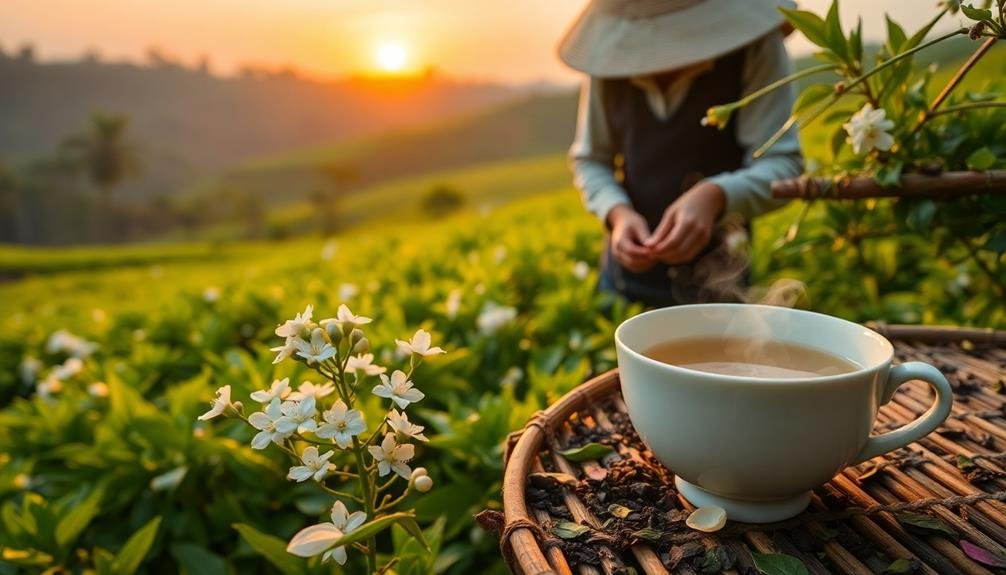
As we shift our focus from safety to sustainability, it's important to reflect on the environmental impact of jasmine tea production.
Sustainable sourcing of jasmine flowers guarantees the longevity of this beloved tea while protecting ecosystems and supporting local communities.
When you choose jasmine tea, look for brands that prioritize sustainable practices. These companies often work directly with farmers to implement eco-friendly cultivation methods, reduce water usage, and minimize pesticide use.
They may also invest in fair trade initiatives, guaranteeing workers receive fair wages and safe working conditions.
To support sustainable jasmine flower sourcing, consider the following:
- Research tea brands' sourcing policies
- Choose organic certified jasmine teas
- Support companies that use renewable energy in production
- Opt for loose leaf tea to reduce packaging waste
Frequently Asked Questions
Can Jasmine Tea Help With Weight Loss?
You might find jasmine tea helpful for weight loss. It's low in calories and can boost metabolism. When you drink it instead of high-calorie beverages, you're reducing your overall calorie intake. It may also aid digestion.
Is Jasmine Tea Safe to Drink During Pregnancy?
You can generally enjoy jasmine tea during pregnancy, but it's best to limit your intake. While it's caffeine content is lower than other teas, it's still present. Always consult your doctor for personalized advice on pregnancy-safe beverages.
How Does Jasmine Tea Compare to Green Tea in Health Benefits?
You'll find jasmine tea and green tea share many health benefits. They're both rich in antioxidants and may boost metabolism. However, jasmine tea offers additional relaxation properties due to its floral aroma, while green tea's caffeine content is higher.
Can Jasmine Tea Be Consumed Cold or Iced?
Yes, you can enjoy jasmine tea cold or iced. It's invigorating and delicious when chilled. Simply brew it as usual, let it cool, and pour over ice. You'll love its floral aroma and smooth taste when served cold.
Does Jasmine Tea Have Any Skin Care Benefits When Applied Topically?
You'll find jasmine tea can benefit your skin when applied topically. It's rich in antioxidants that fight free radicals, potentially reducing signs of aging. It may also help soothe inflammation and improve your skin's overall appearance.
In Summary
You've discovered why jasmine tea is the perfect relaxation blend. Its rich history, delightful aroma, and potential health benefits make it a go-to choice for unwinding. Whether you're sipping it alone or blended with other herbs, you'll enjoy its unique flavor profile. Remember to take into account the caffeine content and any health precautions. By choosing sustainably sourced jasmine, you're not only relaxing but also supporting ethical practices. Embrace this aromatic brew for your next moment of calm.

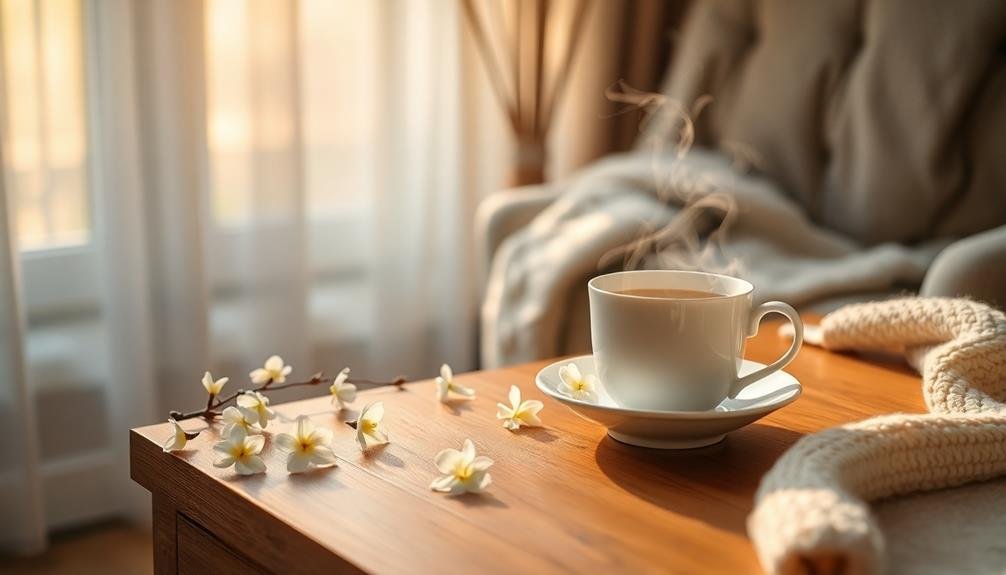

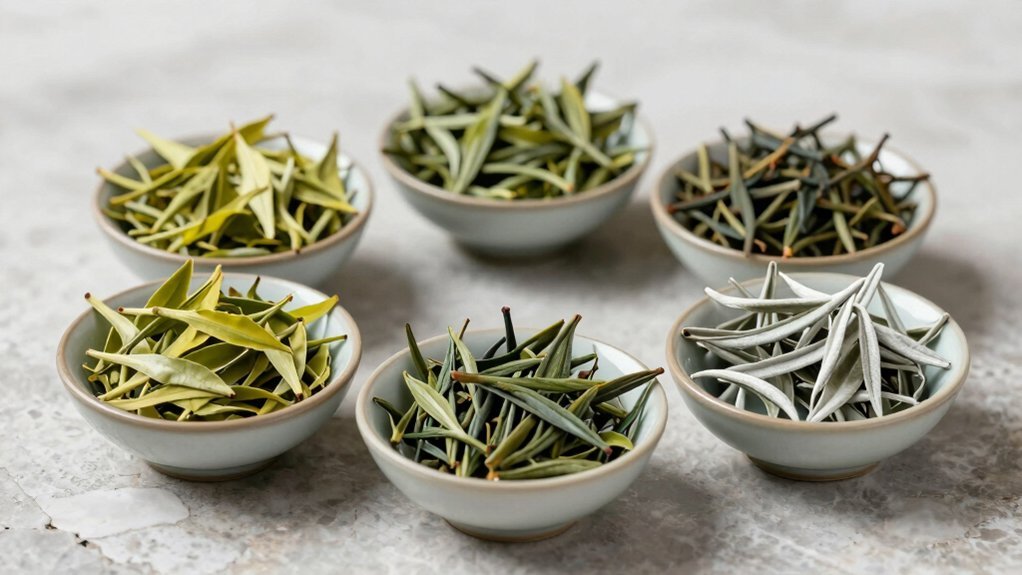
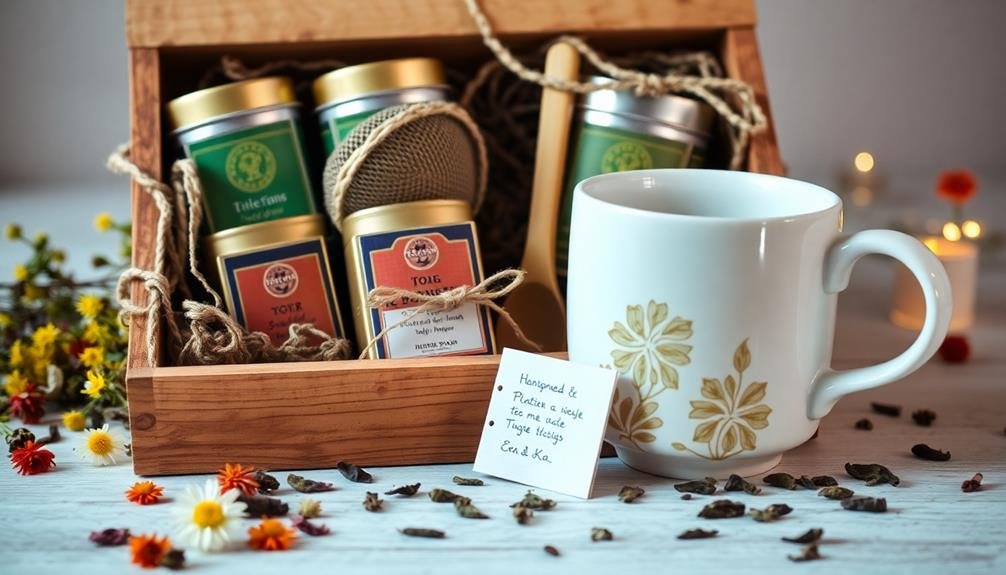
Leave a Reply